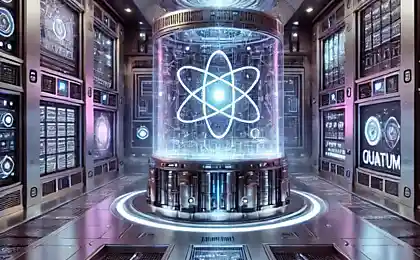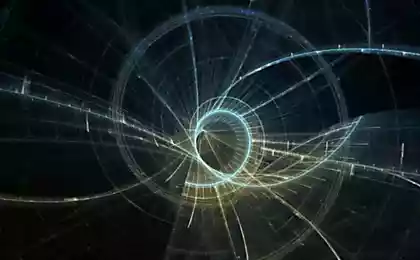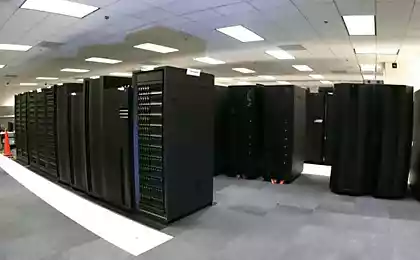564
Why should we care about quantum computers?
Twenty four million five hundred ten thousand four hundred seven
Even if the word "quantum" doesn't scare you, quantum computers remain rather bizarre concepts of science fiction than reality. However, recent advances in this field suggest that these insanely fast computers may appear sooner than we think. And we have many reasons to worry about their arrival.
Ray Johnson, a member of the Board of Directors of a startup quantum computing QxBranch, one of the many companies that are working to move quantum computers from the labs into the real world, talked about those reasons in an interview with Business Insider.
The temptation of quantum computers is their ability to solve almost intractable problems — problems so complex that to solve them, modern computers would need decades. In theory a quantum computer can solve those questions while you drink your morning coffee.
"Insoluble" problemone computers that we use every day, use"bits" to store information is 1 and 0 and the rows of these zeros and ones representing a certain number or letter.
In contrast, quantum computers take advantage of a rather strange physical phenomena, when tiny particles can exist in multiple places at the same time. Instead of using bits, having only two "installations", they use quantum bits, or "qubits", which have additional installation: they can be 1 or 0, or 1 and 0 simultaneously.
Thus, an ordinary computer with two bits can encode information only in four possible combinations: 00, 01, 10, 11. A quantum computer can take all these four combinations at the same time. This allows it to handle exponentially more information than can conventional computers.
Another way to think about the difference between regular and quantum computers is to think about the version of the famous problem of the travelling salesman problem in mathematics. In this task, you — the salesman, planning a trip and you want to find out which route in 10 different cities to be the cheapest (cost) and the fastest.
A normal computer will have to calculate the length of all of these routes separately, and then compare the results determining the winner. A quantum computer can calculate the lengths of all paths simultaneously, because the qubits can process a lot of information simultaneously — and therefore faster.
Quantum razlicitosti several obstacles to the proliferation of quantum computers worldwide.
Currently, these computers should be stored in the supercooled conditions, and even slight anxiety will lead to the collapse of their delicate condition. However, thanks to a major breakthrough in March Google engineers have figured out how to make quantum computers more stable — some even say that we are halfway to a fully functional quantum computers. Google, NASA and IBM are working hard on the realization of this idea.
And when we finally reach this point, quantum computers will be able to carry out a revolution in virtually every industry.
Johnson, former CTO of Lockheed Martin, explained that the computers that we have now, well do what people are doing wrong. For example, people can't remember 10 million numbers, arrange them in a table, and then quickly make calculations with these numbers. But do computers.
A quantum computer will not be able to do it faster than any conventional computer. No better or faster way to perform calculations with a set of numbers. However, quantum computers can bridge the gap between what computers do well and what people do well.
People are good at making their way through the complex installation and choose the right things of these arrays. Our brains do it naturally and with a much lower cost than the computer. Quantum computers, however, will work more like the human brain.
The fact is that, like people, quantum computers can learn from experience. For example, if the quantum computer is running program that does a specific task; they are able to make changes to the code of this program and to save her from making mistakes in the future.
This concept is called machine learning. It is similar to how your postal service learns which emails to send to spam and which are not, only more clever. Machine learning of quantum computers will allow us to do many things faster and with greater efficiency.
Primegenerator quantum, quantum computers can substantially improve the aerospace, military and defense system. With all the satellites we have, we continuously collect tons of images and videos. Most of these data no one looks at because it is difficult to understand. Including because modern computers not very well recognize and select the desired data from the collected series.
Quantum computers can sort huge amounts of data faster and more accurately people who need to view images and videos to understand their meaning.
The same ability of quantum computers could lead us to safe transport. Quantum computers can be the basis of a semi-automatic car (not such interesting as driverless cars Google, but still), which can warn us of a possible collision and to make some decisions while riding.
We don't know even one percent of the capabilities of quantum computers and associated changes. Johnson believes that we will see more breakthroughs in the next few years and important changes in five years.
A quantum computer in every home — the plan is quite long term. But the key point is the creation of a simple interface that anyone can use. On this and works QxBranch. However, industrial and commercial applications of quantum computers does not seem so long. published
Source: hi-news.ru
Even if the word "quantum" doesn't scare you, quantum computers remain rather bizarre concepts of science fiction than reality. However, recent advances in this field suggest that these insanely fast computers may appear sooner than we think. And we have many reasons to worry about their arrival.
Ray Johnson, a member of the Board of Directors of a startup quantum computing QxBranch, one of the many companies that are working to move quantum computers from the labs into the real world, talked about those reasons in an interview with Business Insider.
The temptation of quantum computers is their ability to solve almost intractable problems — problems so complex that to solve them, modern computers would need decades. In theory a quantum computer can solve those questions while you drink your morning coffee.
"Insoluble" problemone computers that we use every day, use"bits" to store information is 1 and 0 and the rows of these zeros and ones representing a certain number or letter.
In contrast, quantum computers take advantage of a rather strange physical phenomena, when tiny particles can exist in multiple places at the same time. Instead of using bits, having only two "installations", they use quantum bits, or "qubits", which have additional installation: they can be 1 or 0, or 1 and 0 simultaneously.
Thus, an ordinary computer with two bits can encode information only in four possible combinations: 00, 01, 10, 11. A quantum computer can take all these four combinations at the same time. This allows it to handle exponentially more information than can conventional computers.
Another way to think about the difference between regular and quantum computers is to think about the version of the famous problem of the travelling salesman problem in mathematics. In this task, you — the salesman, planning a trip and you want to find out which route in 10 different cities to be the cheapest (cost) and the fastest.
A normal computer will have to calculate the length of all of these routes separately, and then compare the results determining the winner. A quantum computer can calculate the lengths of all paths simultaneously, because the qubits can process a lot of information simultaneously — and therefore faster.
Quantum razlicitosti several obstacles to the proliferation of quantum computers worldwide.
Currently, these computers should be stored in the supercooled conditions, and even slight anxiety will lead to the collapse of their delicate condition. However, thanks to a major breakthrough in March Google engineers have figured out how to make quantum computers more stable — some even say that we are halfway to a fully functional quantum computers. Google, NASA and IBM are working hard on the realization of this idea.
And when we finally reach this point, quantum computers will be able to carry out a revolution in virtually every industry.
Johnson, former CTO of Lockheed Martin, explained that the computers that we have now, well do what people are doing wrong. For example, people can't remember 10 million numbers, arrange them in a table, and then quickly make calculations with these numbers. But do computers.
A quantum computer will not be able to do it faster than any conventional computer. No better or faster way to perform calculations with a set of numbers. However, quantum computers can bridge the gap between what computers do well and what people do well.
People are good at making their way through the complex installation and choose the right things of these arrays. Our brains do it naturally and with a much lower cost than the computer. Quantum computers, however, will work more like the human brain.
The fact is that, like people, quantum computers can learn from experience. For example, if the quantum computer is running program that does a specific task; they are able to make changes to the code of this program and to save her from making mistakes in the future.
This concept is called machine learning. It is similar to how your postal service learns which emails to send to spam and which are not, only more clever. Machine learning of quantum computers will allow us to do many things faster and with greater efficiency.
Primegenerator quantum, quantum computers can substantially improve the aerospace, military and defense system. With all the satellites we have, we continuously collect tons of images and videos. Most of these data no one looks at because it is difficult to understand. Including because modern computers not very well recognize and select the desired data from the collected series.
Quantum computers can sort huge amounts of data faster and more accurately people who need to view images and videos to understand their meaning.
The same ability of quantum computers could lead us to safe transport. Quantum computers can be the basis of a semi-automatic car (not such interesting as driverless cars Google, but still), which can warn us of a possible collision and to make some decisions while riding.
We don't know even one percent of the capabilities of quantum computers and associated changes. Johnson believes that we will see more breakthroughs in the next few years and important changes in five years.
A quantum computer in every home — the plan is quite long term. But the key point is the creation of a simple interface that anyone can use. On this and works QxBranch. However, industrial and commercial applications of quantum computers does not seem so long. published
Source: hi-news.ru























